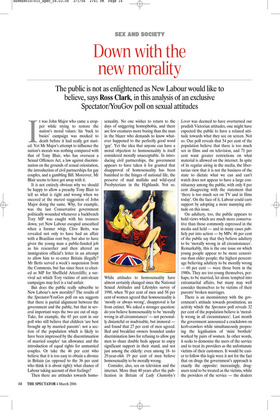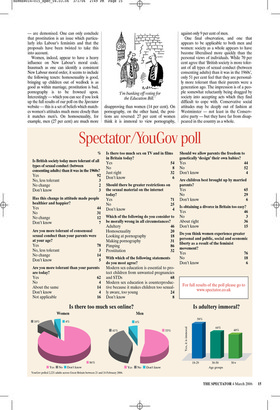Down with the new morality
The public is not as enlightened as New Labour would like to believe, says Ross Clark, in this analysis of an exclusive Spectator/YouGov poll on sexual attitudes It was John Major who came a cropper while trying to restore the nation’s moral values: his ‘back to basics’ campaign was mocked to death before it had really got started. Yet Mr Major’s attempt to influence the nation’s morals was nothing compared with that of Tony Blair, who has overseen a Sexual Offences Act, a law against discrimination on the grounds of sexual orientation, the introduction of civil partnerships for gay couples, and a gambling Bill. Moreover, Mr Blair seems to have got away with it.
It is not entirely obvious why we should be happy to allow a preachy Tony Blair to tell us what is right and wrong when we sneered at the merest suggestion of John Major doing the same. Why, for example, was the last Conservative government politically wounded whenever a backbench Tory MP was caught with his trousers down, yet New Labour escaped unscathed when a former whip, Clive Betts, was revealed not only to have had an affair with a Brazilian rent boy, but also to have given the young man a public-funded job as his researcher and then altered an immigration official’s letter in an attempt to allow him to re-enter Britain illegally? Mr Betts served a week’s suspension from the Commons, but has since been re-elected as MP for Sheffield Attercliffe; a survival act which Tory victims of anti-sleaze campaigns may feel is a tad unfair.
But does the public really subscribe to New Labour’s new morality? The results of the Spectator/YouGov poll on sex suggests that there is partial alignment between the government and the public, but that in several important ways the two are out of step. Take, for example, the 65 per cent in our poll who still believe that children ‘are best brought up by married parents’: not a section of the population which is likely to have been impressed by the discontinuation of married couples’ tax allowance and the introduction of equal rights for unmarried couples. Or take the 46 per cent who believe that it is too easy to obtain a divorce in Britain (as opposed to the 36 per cent who think it is about right): what chance of Labour taking account of their feelings?
Then there are attitudes towards homo sexuality. No one wishes to return to the days of sniggering homophobia, and there are few creatures more boring than the man in the blazer who demands to know whatever happened to the perfectly good word ‘gay’. Yet the idea that anyone can have a moral objection to homosexuality is itself considered morally unacceptable. In introducing civil partnerships, the government appears to have taken it for granted that disapproval of homosexuality has been banished to the fringes of national life, the preserve of mad mullahs and wild-eyed Presbyterians in the Highlands. Not so.
While attitudes to homosexuality have almost certainly changed since the National Sexual Attitudes and Lifestyles survey of 1990, when 70 per cent of men and 58 per cent of women agreed that homosexuality is ‘mostly or always wrong’, disapproval is far from extinct. We asked a stronger question: do you believe homosexuality to be ‘morally wrong in all circumstances’ — not personally distasteful or inadvisable, but immoral and found that 27 per cent of men agreed. Bed and breakfast owners hounded under discrimination laws for refusing to allow gay men to share double beds appear to enjoy significant support in their stand, and not just among the elderly: even among 18to 29-year-olds 19 per cent of men believe homosexuality to be morally wrong.
Consider, also, sex on television and the internet. More than 40 years after the publication in Britain of Lady Chatterley’s Lover was deemed to have overturned our prudish Victorian attitudes, one might have expected the public to have a relaxed attitude towards what they see on screen. Not so. Our poll reveals that 54 per cent of the population believe that there is too much sex in films and on television, and 71 per cent want greater restrictions on what material is allowed on the internet. In spite of its regular airing in the media, the libertarian view that it is not the business of the state to dictate what we can and can’t watch does not appear to have a large constituency among the public, with only 8 per cent disagreeing with the statement that ‘there is too much sex on TV and in films today’. On the face of it, Labour could earn support by adopting a more nannying attitude on this issue.
On adultery, too, the public appears to hold views which are much more conservative than those commonly expressed in the media and held — and in many cases publicly put into action — by MPs: 46 per cent of the public say that they believe adultery to be ‘morally wrong in all circumstances’. Remarkably, this is the one issue on which young people appear to be more censorious than older people; the highest percentage believing adultery to be morally wrong — 60 per cent — were those born in the 1980s. They are too young themselves, perhaps, to be married, let alone tempted into extramarital affairs, but many may well consider themselves to be victims of their parents’ broken marriages.
There is an inconsistency with the government’s attitude towards prostitution, an activity which the Spectator poll reveals 32 per cent of the population believe is ‘morally wrong in all circumstances’. Last month the government announced a crackdown on kerb-crawlers while simultaneously proposing the legalisation of ‘mini brothels’ worked by pairs of women. In other words, it seeks to demonise the users of the service and to treat its providers as the unfortunate victims of their customers. It would be easier to follow this logic were it not for the fact that on drugs the government’s approach is exactly the opposite: increasingly, drugusers tend to be treated as the victims, while the providers of the service — the dealers — are demonised. One can only conclude that prostitution is an issue which particularly irks Labour’s feminists and that the proposals have been twisted to take this into account.
Women, indeed, appear to have a heavy influence on New Labour’s moral code. Inasmuch as one can identify a consistent New Labour moral order, it seems to include the following tenets: homosexuality is good, bringing up children out of wedlock is as good as within marriage, prostitution is bad, pornography is to be frowned upon. Interestingly — which you can see if you look up the full results of our poll on the Spectator website — this is a set of beliefs which matches women’s attitudes much more closely than it matches men’s. On homosexuality, for example, men (27 per cent) are much more disapproving than women (14 per cent). On pornography, on the other hand, the positions are reversed: 27 per cent of women think it is immoral to view pornography, against only 9 per cent of men.
One final observation, and one that appears to be applicable to both men and women: society as a whole appears to have become liberalised more quickly than the personal views of individuals. While 70 per cent agree that ‘British society is more tolerant of all types of sexual conduct (between consenting adults) than it was in the 1960s’, only 51 per cent feel that they are personally more tolerant than their parents were a generation ago. The impression is of a people somewhat reluctantly being dragged by society into accepting acts which they find difficult to cope with. Conservative social attitudes may be deeply out of fashion at Westminster — not least in the Conservative party — but they have far from disappeared in the country as a whole.











































































 Previous page
Previous page